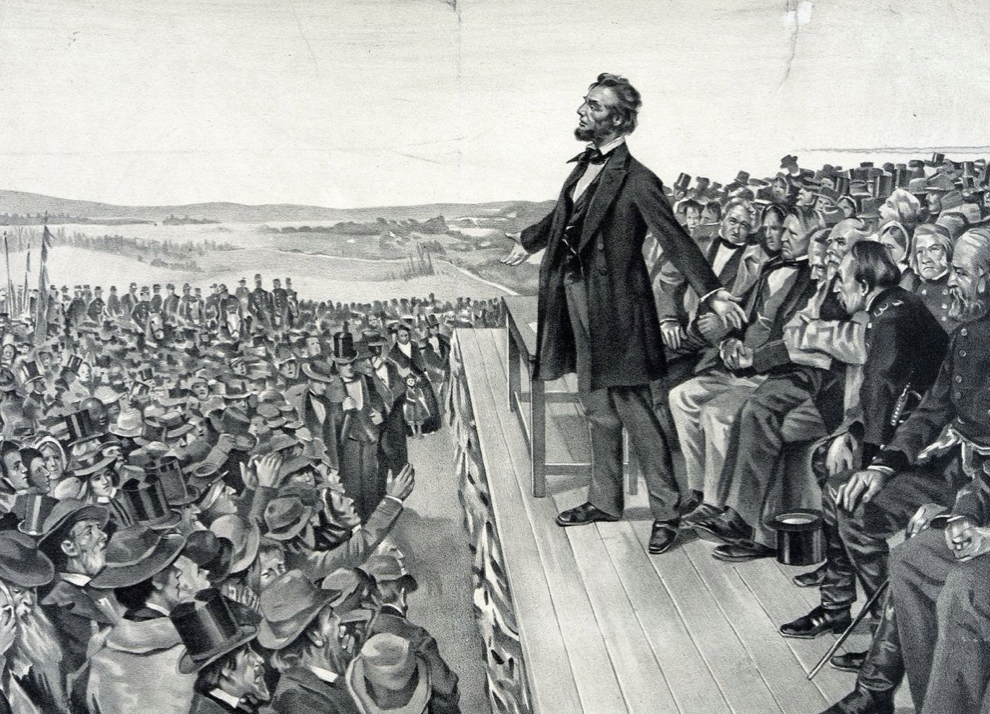By
The news of the great battle at Gettysburg came to Abraham Lincoln by fits and starts. But when it was finally confirmed on the morning of July 4, 1863, that Robert E. Lee’s Confederate army had been forced to retreat, the tidings couldn’t have been more welcome. To a crowd of well-wishers who gathered outside the White House, Lincoln exulted that “the cohorts of those who opposed the declaration that all men are created equal” had at that great battle “ ‘turned tail’ and run.”
What they expected was probably perfunctory. But Lincoln gave them something far beyond their expectations. In 272 terse and simple words, the president laid out the story of the American republic in three stages: past (“four score and seven years ago”), present (“now we are engaged in a great civil war, testing whether this nation, or any nation so conceived and so dedicated, can endure”) and future (“we here highly resolve that these dead shall not have died in vain”).
The brevity of Lincoln’s remarks also left the Gettysburg Address dark with hidden lights. Why the oddly biblical opening? Why the invocation of 1776 and the Declaration of Independence rather than 1787 and the Constitution? What would have happened if, in the ensuing two years of the Civil War, we had failed the “testing”?
The least well-examined words of the address, however, are its expansive triplet: “government of the people, by the people, for the people.” This wasn’t merely a rhetorical flourish. In that triplet, Lincoln lays out the three fundamental elements of democracy. The first is consent—government of the people. “According to our ancient faith,” Lincoln said in his 1854 speech objecting to the Kansas-Nebraska Act, which compromised on slavery, “the just powers of governments are derived from the consent of the governed.” That meant plainly “that no man is good enough to govern another man, without that other’s consent. I say this is the leading principle—the sheet anchor of American republicanism.”
A second distinctive feature of democracy is the people’s voice in the affairs of governing—government by the people. It matters little whether that active voice is the direct participation of individuals, as in ancient Athens, or through their representatives, as in the American Constitution. From his earliest moments in politics, Lincoln argued that government by the people—through their laws and through elections, and not by mobs with nooses and shotguns—was the only legitimate expression of democracy. “I do not deny the possibility that the people may err in an election,” he conceded in 1861. “But if they do, the true cure is in the next election.”
The third basic element of democracy is a government that serves the interests of the people—government for the people—not those of a monarch, an aristocracy or an angry and contemptuous elite. For that reason, Lincoln wrote, government served to do only those things that need “to be done, but which they can not, by individual effort, do at all, or do so well, for themselves,” such as roads and bridges, schools and asylums, the enforcement of the laws and the defense of the nation. While government isn’t “charged with the duty of redressing, or preventing, all the wrongs in the world,” he said in 1859, it does have the responsibility to keep from “planting and cultivating too many thorns in the bosom of society.”
Lincoln’s address at Gettysburg wasn’t an explosion of rhetorical fireworks. That kind of speaking was reserved for Everett’s 13,000-word oration, teeming with classical allusions to Thucydides and Pericles but without a single sentence anyone could remember afterward. Lincoln’s was an essay on why American democracy had been founded, why it was worth the sacrifice to preserve, and what the country could anticipate if it emerged whole from the conflict. The example of that sacrifice would stimulate “a new birth of freedom,” like the new birth revival preachers had exhorted people to embrace—a revitalization of the original purpose of the American Founding that would, as Lincoln said in 1858, “turn this government back into the channel in which the framers of the Constitution originally placed it.”
That new birth is the task that lies before every succeeding generation of Americans. In it, we find our way not only back to Lincoln but to democracy itself. We return to the dignity of a human form that can stand upright before its Creator, with no autocrat or prince casting an intervening shadow, with hands outstretched to nature and its God, and to each other. When we do, the shades of those Lincoln honored at Gettysburg will embrace us, as the sun shines again on government of the people, by the people, for the people.
To see this article in its entirety and subscribe to others like it, choose to read more.
 Listen Online
Listen Online Watch Online
Watch Online Find a Station in Your Area
Find a Station in Your Area










 Listen Now
Listen Now Watch Online
Watch Online
